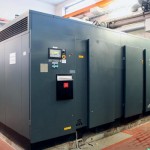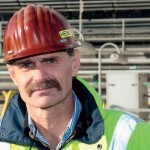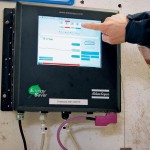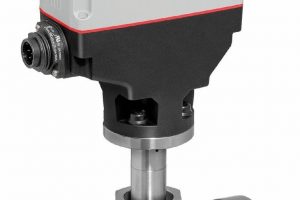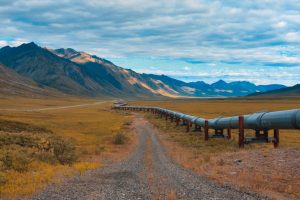In recent years, Evonik in Wesseling has installed two new turbo compressors from Atlas Copco, complete with a higher-level controller. In addition to cutting out unproductive idle time, these machines repaid their investment after a very short period in terms of the energy saving alone. The fact that the compressors are oil-free is an additional advantage for the owner.
“Productivity in our business areas has doubled, and in some facilities even trebled, since the 1980s“, says Heinz Blindert, planning engineer at Evonik Degussa GmbH in Wesseling. Methionine, an amino acid used as a feed additive, is produced flat out, for example; the same is true of several silica products, which are needed amongst other things in the production of tyres or toothpaste.
The fact that business is booming means the production of compressed air has to keep pace accordingly: five years ago, the first Atlas Copco ZH turbo compressor was installed in the power house, closely followed by a second in the summer of 2006. In the meantime, Blindert has also exchanged an old screw compressor, likewise manufactured by Atlas Copco, for a new one. “It had seen better days“, he stresses, “and had well over 100,000 operating hours on the clock“. When, finally, a defect appeared in the motor, servicing it seemed futile. Regular maintenance and servicing have prolonged the fourth compressor’s life to 35 years, as a glance inside the power house reveals: alongside the three new compressors, this veteran model built in 1973 is still doing its fair share of the work, proudly proclaiming “next lubrication after 178,000 hours“.
The four compressors at the Wesseling site are operated twenty-four hours a day, as is common practice in the process industry. Almost all of the facilities require compressed air, be it for measuring filling levels, controlling valves or running pumps, for example in the biological purification plant. “The air-operated pumps convey the effluent water in the phosphate precipitation, enabling it to be discharged into the Rhine completely unpolluted“.
In the eyes of Heinz Blindert, responsible for planning, the turbo compressors in the ZH series have several benefits that justify their higher price compared to conventional screw compressors. “The level of efficiency is far superior”, he emphasises, “because a turbo only compresses the amount of air that actually enters the machine via the preliminary fan“. The controller can adjust the volume flow sucked in via the entry fan more effectively and also automatically to meet requirements, without compressing air wastefully and having to blow it out again. It behaves differently from a screw compressor, which works according to the displacement principle, making idle phases with high energy consumption inevitable. However, if the turbo is deployed as a base load machine and the whole facility, as is the case at Evonik, operated by a performance-based higher-level controller, costly exhaust situations and idle times can be avoided completely. “As a result, the turbo pays off in terms of the energy saving alone“, Blindert continues, although he prefers not to be too specific about the timeframe.
Another advantage of turbo compressors is their considerably lower running noise because they do not have any operating cycles. “Compared to screw compressors, turbo compressors are practically silent“, says Blindert.
These machines are fitted with air intake filters, noise absorbers, aftercoolers and check valves. They have a coolant collecting main, condensate interceptor and drainer after every cooler as well as compensators for air and water at the entrances and exits. The lubrication system is completely integrated, as are the blow-off valve and sound damper. The ZH compressor is delivered ready to connect and can be installed without a special foundation.
Higher-level controller
According to Blindert, an average of between 10,000 and 12,000 m³ of air is currently produced and distributed at a rate of 6.2 bars an hour on the spacious Evonik site, which boasts a compressed air supply network measuring 2 x 13 km. “A peak demand of 2000 m3 is by no means unusual in our process, for example if individual operations rejoin the network after standstill or if piping is emptied with a lot of air for cleaning purposes“. He explains that certain pneumatic tools also need a large amount of air. These diverse requirements are all controlled automatically and intelligently. “The beauty of this is that we can operate several types of compressors linked to the system“. The higher-level controller even manages to maintain the pressure with a fluctuation margin of less than 0.1 bar. Often, the variations are as little as four hundredths or even less, because it always selects the optimal combination of volume flow and specific performance from the four compressors according to actual demand. This avoids idle periods and permits lower pressure. Nevertheless, Evonik operates the entire network with a small safety buffer, as consumers only require about 5.6 bar and not the 6 bar or more produced. The valves are switched to safe mode below 5.4 bars.
All compressors transport in two different conduit systems arranged in parallel. Heinz Blindert: “Our top priority is control air – if the system falls below the minimum pressure, all of the measurement, control and regulating units have to carry on functioning and in the worst case scenario the process is shut down in a controlled way. The pneumatic dispenser and tools that are operated with the downstream air therefore break down first”.
Absence of oil
In all of these applications, the compressed air comes into direct contact with the fluid base materials or finished powders. This means they must not contain a single drop of oil: “Oil could condense and accumulate on the product”, warns Heinz Blindert. “This can lead to a variety of problems that we cannot tolerate”. In a slightly better scenario, agglomerations resulting in an end product that fails to meet the specification could form; this product would then be unsaleable because it could cause problems in processing. Even more dramatic would be contaminated feedstuff (potentially harmful to animal health). “Compressed air with aerosols would therefore be unacceptable to us“. The aerosols would condense on the cold pipe walls on their long route from the compressor to the facilities and find their way to the deepest consumer. “What is not introduced beforehand when the compressed air is produced using oil-free compressors has to be removed later with minimal effort” – this could be described as the motto of the experienced planning engineer for infrastructure operations. “We consequently only use compressors that manage completely without oil“. This is the case with both the ZH turbo compressors and the screw compressors in the ZR series doing duty in Wesseling.
Simple compressed air drying
Incidentally, the air in all Degussa’s compressors is conducted via MD dryers, including that in the turbo compressors. Atlas Copco always recommends this dryer series as standard for its screw compressors for this reason. “These dryers use the waste heat from the compressor as regenerative energy for compression”, explains Reimund Scherff, Business Line Manager Oil-Free Air at Atlas Copco Kompressoren und Drucklufttechnik GmbH in Essen. “Regeneration is temperature-dependent and the temperature must not fall below 120 °C“. A turbo compressor, however, typically runs at considerably lower temperatures than a screw compressor, which is no longer sufficient for the dryer in idle phases. “At Evonik, however, the turbo drives a defined base load with an additional hot-air outflow and the network is operated at relatively high pressure”, Scherff continues. Due to the absolutely constant conditions, which largely result from continuous chemical processes, this works impeccably at the Wesseling plant.
Heinz Blindert favours the MD series for two reasons: firstly, three dryers of this kind were already in place and secondly, these units require no additional energy, making do instead with the compression energy from the compressors.
cpp 400
Evonik Degussa
Turbo compressors of the ZH series
Hannover Messe 2008
Share:



